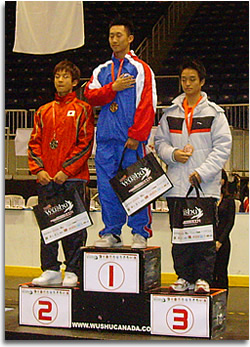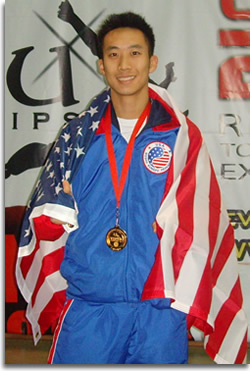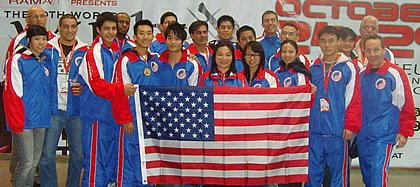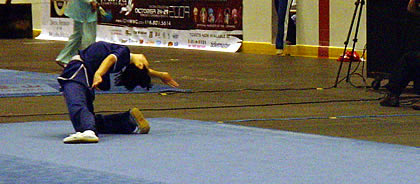Has American Wushu Arrived? A Report on the 10th World Wushu Championships
Below is an article posted by Kung Fu Magazine. I was asked a set of interview questions which were used for this article. Anthony Roberts actually asked me a lot of stimulating questions that prompted me to think about my wushu training, career, and development. A lot of those responses are in the article below, but I will be following up with the direct Q&A on AlfredRocks.com’s blog and WushuKicks.com as well.
Here is the follow up article – On Becoming a World Champion: Alfred Hsing Q&A
——————————————————————————————–
Has American Wushu Finally Arrived?
A Report on the 10th World Wushu Championships
by Anthony Roberts
 Wushu in America has had its ups and downs. Even with a large immigrant Chinese population on the West Coast and in the Northeast, the sport has not seen as much growth here as in many other parts of the world. In Southeast Asia, wushu is thriving, in Europe it is well-established, and even in the Middle East, governments subsidize it.
Wushu in America has had its ups and downs. Even with a large immigrant Chinese population on the West Coast and in the Northeast, the sport has not seen as much growth here as in many other parts of the world. In Southeast Asia, wushu is thriving, in Europe it is well-established, and even in the Middle East, governments subsidize it.
None of this is to say that wushu has done poorly or been neglected here. Past teams, in whom we take great pride, almost always posted good results at the biennial World Wushu Championships. At the 7th World Games in 2003, for example, Elaina Maxwell won the gold in women’s 65 kg sanshou. More recently (in 2007), six athletes finished in the top eight in one or more events at the 9th World’s.
Still, perhaps we can be forgiven for an American pride that leaves us unsatisfied with anything less than number one. When would the time come for a U.S. team to crush the competition – or, failing that, at least bruise them up a little?
It appears the time is now.
Kung Fu Fighting with Canucks
On October 24, 2009, over seven hundred competitors from seventy-four nations converged on Toronto, Canada for the 10th World Wushu Championships. The U.S. team had a rocky start even prior to the first day of competition, losing athletes and officials in the weeks leading up to the championships. Instead of twenty competitors, the U.S. fielded only nine for taolu and five for sanshou.
Compounding the uncertainty about America’s prospects was a new selection process adopted for the taolu team trials. For the past several years, the sole deciding factor for selection to the team was score; now, spots were reserved for specific events, such as taijiquan and nanquan (though there was still a minimum score requirement).
On the very first day of competition, however, it became clear that the U.S. had chosen a great team. Alfred Hsing, representing his country for the first time in a world championship, came out of the gate in style, scoring a 9.72 in men’s straight sword. Flawlessly executing degree-of-difficulty movements, he captured first place early on. When Etsuro Shitaokoshi of Japan also scored 9.72, there followed some tense moments for the U.S. team as the judges applied the tie-breaking rules. But Alfred came out on top, winning America’s first-ever gold in taolu competition at the world championships.
More great news followed on this banner day for American wushu as U.S. team veteran Colvin Wang captured the silver medal in men’s spear. This came not long after he had scored eighth in men’s straight sword (just 0.5 points behind Alfred).
The results for the U.S. team did not end with Alfred and Colvin’s medals. By the end of the tournament, seven other U.S. athletes (five taolu and two sanshou) would finish in the top eight in at least one event, for a total of ten top-eight finishes.
Portrait of a Life in Wushu
Looking back on the experience, Alfred Hsing says, “In training for the world championships, I knew that there would be no room for mistakes, so I practiced focusing on perfection. Perfect speed, perfect difficulty moves, perfect stances, everything. After I finished my form I felt really good. I knew I nailed everything. Winning the medal was everything I dreamed it would be.”
It had been a long road for Alfred. After failing to make the U.S. team in 2003, he almost gave up on wushu; but in 2006 he noticed that his friends had continued training and were making progress in the sport. This inspired him to begin chasing his dream again.
 “I trained really hard in 2006 and 2007, which allowed me to catch back up to a top-level U.S. standard, but still it wasn’t enough.” Indeed, he only qualified for the C team at the trials that year (the second alternates, way down on the totem pole). “I was at a crossroads,” he says. “Get back to reality and focus on my career or risk my corporate job and focus on wushu for another 2 years. I chose wushu.”
“I trained really hard in 2006 and 2007, which allowed me to catch back up to a top-level U.S. standard, but still it wasn’t enough.” Indeed, he only qualified for the C team at the trials that year (the second alternates, way down on the totem pole). “I was at a crossroads,” he says. “Get back to reality and focus on my career or risk my corporate job and focus on wushu for another 2 years. I chose wushu.”
Even after making the team, it was not easy for Alfred. “I think a lot of other U.S. wushu team members would agree that after the U.S. team trial competition you feel a little burnt out from training. I trained as intense as I possibly could to ensure I could make the US team… After three or four months of rigorous training, when you make the team, you realize you have to keep it up for another four or five months.” He compared this feeling to finishing a marathon only to see you have another 26.2 miles to run.
But Alfred stuck with it, showing the true power of positive thinking. “A lot of people said it would be impossible to win a gold medal at the World Wushu Championships, but the few people who didn’t know much about wushu that said ‘go for the gold’ made me think that it was possible. I adjusted my mindset a few weeks before the competition and felt that it was achievable. When you don’t believe you can do it, of course you won’t be able to.”
Colvin Wang had posted impressive results at the last world championships and competed at World Wushu Tournament Beijing 2008 (the unofficial “Olympics” tournament). At the 2nd World Junior Wushu Championships in 2008, he had also won a silver medal in spear. The medal he earned in Toronto thus represents the evolution of a talented athlete, still in high school, whose wushu star is on the rise.
“Training wasn’t easy,” he says, “because I’m trying to balance a very crucial period in school and train at the same time. I never had enough time to do enough of both. I still tried to manage an hour or two each day. By competition time, I felt pretty ready.”
Colvin’s high expectations mean he could never be completely happy with his medal-winning performance. Still, he says: “It’s always good to let go of any expectations you have before a competition, so I made sure I had no expectations before doing my form. It was definitely nice to have my accomplishment awarded with a world championship medal – not something that is given to many people. I will keep the medal as a token of all the hard work I put in to earn it.”

Memories and Reflections
In addition to athletes, coaches, and other officials, family and friends were also part of the U.S. team. Keeping everything organized and all team members in-the-know was Malee Khow of Connecticut, team manager and chairperson of the USAWKF Competition Management Committee. “It was a great honor to lead this team,” she says, “and to watch as Alfred, Colvin, and all the athletes did such an outstanding job. It makes all the organizing work in the months beforehand feel worth it.”
The team took away many great memories from the championships, meeting friends old and new from all over the world. “I think we worked well as a team,” says Colvin Wang, “had a lot of fun, supported each other, and all have valuable memories to take away from this experience.” Alfred Hsing concurs: “I am going to have great memories of my trip to Toronto… It just so happened that along with bringing home a good score, I also had great teammates that all got along, a good roommate on the trip, a venue in Toronto that was close enough for my parents and friends to come watch.”
Many team members remarked that the Chinese were not as dominant as in previous championships, where the taolu team in particular always takes first place. This year, while still leading all countries in medals won with six in taolu and eight in sanshou, China posted more modest results than in previous years. Whether this signals a true leveling of the playing field in worldwide wushu or, more likely, a decision by China not to send its best athletes, is a question others can concern themselves with. Let us Americans not speculate on what we cannot know – rather, we should be filled with pride and joy for the accomplishments of our athletes.
Indeed, Americans were not the only ones to notice that our athletes made a breakthrough this year. “Many people from other teams mentioned to me how much our team has improved,” says Malee Khow, “even though our athletes are all students or have regular jobs. Many other countries are able to send career athletes, whose job is wushu, or hire coaches to train their athletes full-time. Here in America, wushu is still very much an amateur sport – but that makes our accomplishments at the world championships this year even more special.”
Does this mean, then, that American wushu has finally arrived? Will future teams continue the successes of Toronto? If we look at the results of recent U.S. teams, the indications are that this event was no fluke. At the 9th World Wushu Championships, held at the end of 2007 in Beijing, China, six athletes finished in the top eight of one or more events. In 2008, at the 2nd World Junior Wushu Championships, the young U.S. athletes won four medals, including one gold. The same year, the U.S. brought home eleven medals from the 7th Pan American Wushu Championships held in Brazil.

In wushu as in life, fortunes can change quickly. However, Americans now have good reason for optimism about the future of wushu in our country. Only time will tell.
The U.S. Team Officials
- Delegation Leader: Anthony Goh
- Deputy Delegation Leader and Taolu Team Leader: Malee Khow
- Championships Vice Referee of Taolu: Xiaolin Lu
- Taolu Coach: Zhang Guifeng
- Assistant Taolu Coach: Bangjun Jiang
- Assistant Taolu Coach: Stephon Morton
- Sanshou Team Leader and Coach: Ian Lee
- Sanshou Coach: Jeff Chow
- Assistant Sanshou Coach: Carmine Downey
- Sanshou Judge: Anthony Sims
Taolu Team
Male
- Alfred Hsing
- Peter Dang
- Colvin Wang
- Max Ehrlich
Female
- Sarah Chang
- Joana Pei
- Ashley Chung
- Stephanie Lim
- Elaine Ho
Sanshou Team
Male
- Michael Lee (65 kg)
- Maximillion Chen (70 kg)
- Alex Cisne (80 kg)
- Kasey Corless (90 kg)
Female
- Sonia Mejia (52 kg)
Medal-Winners
- Alfred Hsing (gold medal, men’s straight sword)
- Colvin Wang (silver men, men’s spear)
Other Top Eight Finishes
Taolu
- Sarah Chang (8th place, women’s chang quan)
- Peter Dang (8th place, men’s broadsword)
- Max Ehrlich (7th place, men’s southern broadsword)
- Elaine Ho (8th place, women’s taiji sword)
- Joana Pei (5th place, women’s broadsword)
- Colvin Wang (8th place, men’s straight sword)
Sanshou
- Maximillion Chen (8th place (quarterfinals), men’s 70 kg sanshou)
- Alex Cisne (8th place (quarterfinals), men’s 80 kg sanshou)
Original source: http://www.kungfumagazine.com/ezine/article.php?article=859